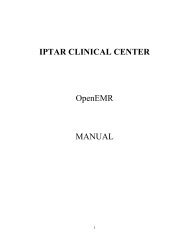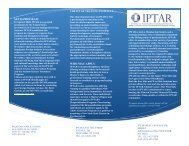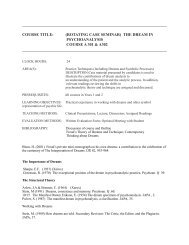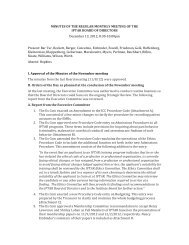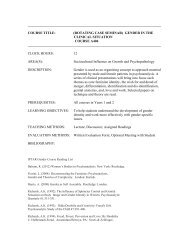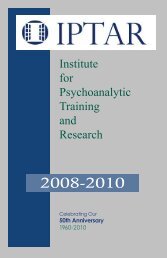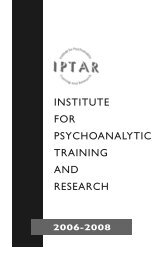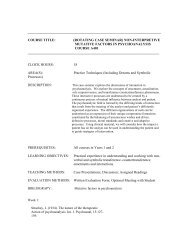IPTAR Bulletin - Institute for Psychoanalytic Training and Research
IPTAR Bulletin - Institute for Psychoanalytic Training and Research
IPTAR Bulletin - Institute for Psychoanalytic Training and Research
You also want an ePaper? Increase the reach of your titles
YUMPU automatically turns print PDFs into web optimized ePapers that Google loves.
THE ANNUAL PROGRAM OF THE INVESTIGATIVE SECTION<br />
(Chairs, Jay Frankel, Ph.D. <strong>and</strong> Norbert Freedman, Ph.D.)<br />
This Section offers a <strong>for</strong>um in which clinical psychoanalytic concepts are examined<br />
in a multifaceted, systematic, <strong>and</strong> critical way. Our aim is to bring together<br />
into a single arena in<strong>for</strong>mation about these concepts gathered from<br />
various sources.Thus, the more familiar path of exploring the foundations or<br />
evolution of a concept through clinical observations <strong>and</strong> conceptual scholarship<br />
is augmented by assessment yielding systematic empirical research.The<br />
empirical research includes reports of the findings of <strong>IPTAR</strong>’S own program<br />
described above as well as the work of other investigators. We also bring in<br />
other investigators to widen our perspective. Since we are concerned with<br />
the epistemological roots of our psychoanalytic ideas, we ask: How do we<br />
know what we think we know about our psychoanalytic concepts?This query<br />
is the heading of one of our <strong>for</strong>thcoming conferences.<br />
During 2006, the Section sponsored four meetings with each <strong>for</strong>um focusing<br />
on different concepts.The themes we explored included:the concept of internalization<br />
of the psychoanalytic experience, the ordinary <strong>and</strong> extraordinary<br />
counter-transference, <strong>and</strong> the effectiveness of psychotherapy with children.<br />
Finally, as our concern is not just with findings but with the method by which<br />
clinical generalizations are arrived at as well, one of our Spring 2006 programs<br />
explicated <strong>and</strong> introduced the method of Clinical <strong>Psychoanalytic</strong> Propositions.<br />
This is an innovative way of describing how analysts can better communicate<br />
about basic concepts.<br />
The 2007 program focused on the concept of dissociation, the concept of<br />
therapeutic regression, <strong>and</strong> the notion of playing–a comparative study of observations<br />
on primates <strong>and</strong> their possible relevance to the notion of ‘play’ in<br />
analytic treatment.<br />
52<br />
DORIS BERNSTEIN MEMORIAL SECTION ON<br />
GENDER-RELATED ISSUES IN PSYCHOANALYSIS<br />
In the spirit of Doris Bernstein’s writings, the Section on Gender-Related Issues<br />
is concerned with the exploration of gender as a specific <strong>and</strong> decisive <strong>for</strong>ce in<br />
human development <strong>and</strong> human experience.The Section sponsors several activities.<br />
It has established an ongoing study group on gender-related issues,<strong>and</strong> in the<br />
Beyond the Basic Curriculum program it offers an advanced seminar,"A Reassessment<br />
of Gender in <strong>Psychoanalytic</strong>Theory <strong>and</strong> Practice." Every other year, the Section<br />
also sponsors the Doris Bernstein Memorial Lecture, a part of <strong>IPTAR</strong>’s Program<br />
of <strong>Psychoanalytic</strong> Meetings.It serves as a resource <strong>for</strong> the <strong>IPTAR</strong> Clinical Center<br />
<strong>and</strong> offers workshops <strong>for</strong> members of the analytic community.<br />
LINDA NEUWIRTH MEMORIAL SECTION ON THE EFFECT<br />
OF THE WORK ON THE ANALYST<br />
In honor of Linda Neuwirth <strong>and</strong> her commitment to excellence in psychoanalytic<br />
training <strong>and</strong> practice, a Section on the Effect of <strong>Psychoanalytic</strong>Work<br />
on the Analyst has been established. Topics of consideration by this group<br />
may include: balancing personal, familial <strong>and</strong> professional dem<strong>and</strong>s; the impact<br />
of illness on the analyst;the pregnant analyst;<strong>and</strong> discussion of analytic cases in<br />
progress. In addition, a Linda Neuwirth Memorial Paper will be chosen annually<br />
from submissions by c<strong>and</strong>idates, recent graduates, <strong>and</strong> members of<br />
<strong>IPTAR</strong>. Criteria <strong>for</strong> the clinical paper include a review of the literature relevant<br />
to the topic, clinical material, <strong>and</strong> presentation of the author’s theoretical<br />
<strong>and</strong> clinical contribution to this topic.The Memorial Paper also welcomes<br />
research proposals,particularly those addressing the psychoanalytic <strong>for</strong>mation<br />
process, once again acknowledging Linda’s commitment to the next generation<br />
of analysts.<br />
SECTION FOR THE STUDY OF<br />
CRITICAL ISSUES IN PSYCHOANALYSIS<br />
(Chair,TBD)<br />
The Section <strong>for</strong> the Study of Critical Issues in Psychoanalysis (SCIP) is a structure<br />
established by <strong>IPTAR</strong> to provide an institutional context <strong>for</strong> <strong>IPTAR</strong> analysts to<br />
work collaboratively with leading analysts from other societies to explore critical<br />
<strong>and</strong> controversial issues in psychoanalysis.At the present time,three study<br />
groups are addressing issues in psychoanalytic technique, while a fourth group<br />
is examining the current status of psychoanalytic developmental theory. Other<br />
projects,which may employ different <strong>for</strong>mats,are currently being planned. The<br />
work of SCIP study groups will be facilitated by the SCIP Empirical Group,<br />
composed of <strong>IPTAR</strong> members <strong>and</strong> c<strong>and</strong>idates, which will provide focused reviews<br />
of empirical findings in accordance with the research needs of each SCIP<br />
group. Each SCIP study group will be responsible to report its findings to the<br />
<strong>IPTAR</strong> community in the <strong>for</strong>m of conferences or written publications.<br />
SCIP study projects are initiated <strong>and</strong> coordinated by the SCIP steering<br />
committee, which identifies critical issues <strong>and</strong> selects the initial members of<br />
each study team. Once established, SCIP study groups are free to enlist<br />
additional members <strong>and</strong> consulting specialists, to employ the research assistance<br />
of the SCIP Empirical Group,<strong>and</strong> to organize their activities in accordance with<br />
their objectives. The duration of each SCIP project is determined by its<br />
participants. The SCIP program is another example of how <strong>IPTAR</strong> integrates <strong>and</strong><br />
exchanges ideas with the larger psychoanalytic community.<br />
53




